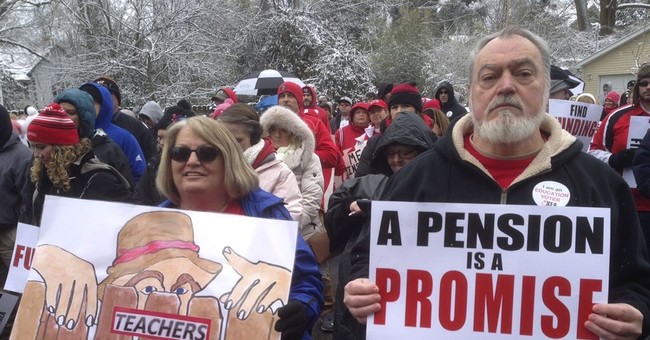
The politicians in Washington rarely let the important get ahead of the urgent and expensive. The spending spree they’ve engaged in to offset the economic impact of the coronavirus lockdown has obligated our children and grandchildren to trillions in debt it won’t be easy to pay off.
How did we get here? The blame doesn’t rest largely or even mostly with the Trump Administration. It goes back over several presidencies and springs from the unwillingness of Congress, no matter which party was in charge, to tackle the thorny issue of entitlements and the financial obligations they place on future generations.
It’s not just Social Security and Medicare that threaten to bankrupt us when they reach the tipping point. The problem of there being too many retirees living longer and healthier than the existing workforce can support is just a drop in the bucket compared to other worries that can already be seen coming at us over the horizon.
Take for example the issue of the many public and private pension plans these same retirees are counting on to provide for them in their golden years crash are now badly underfunded. If they’re allowed to come crashing down it will make what happened after Lehman Brothers failed look like a slight downturn in the markets.
You can blame the politicians for that too, not that it will do much good. The plans they created and authorized, in Washington and at the state level and for employees in the private sector were masterpieces of wealth concentration controlled by so-called experts who keep it all safe for later.
We know now it wasn’t true. These plans have been abused and raided for decades, more than once leaving the workers who funded them holding not the bag but nothing. Alternatives do exist now like Roth IRAs and 401(k)s. Anyone can open one, and often do with their employer contributing or even matching what an individual puts in. They’re preferable to the defined benefit plans of the past, not just because they don’t leave everyone exposed to a potential taxpayer-funded bailout if they go bankrupt but because the individual plans give workers at every level a significant measure of control over the retirement finances.
Every retirement plan should be moving in that direction. Even Social Security needs to make room for private accounts. But all thats’ for later, for the next generations of retirees. There are still problems endemic to the existing system that must be addressed.
One of the most urgent involves the nation’s approximately 1,400 multi-employer plans. As defined by the federal Pension Benefits Guaranty Corporation they are “collectively bargained plan(s) maintained by more than one employer, usually within the same or related industries, and a labor union.” More than one is in financial trouble and all need structural reform.
About 10 million workers are participating in these plans in fields from mining to manufacturing to trucking. They’re not only the so-called essential employees who’ve kept the rest of us supplied with foods and other goods and help keep the lights on and the Internet access up, they’re a powerful voting block.
If Mitch McConnell, Kentucky Republican who runs the Senate wants to continue to doing so for the next two years, he needs to make the issue more of a priority than it’s been according to a survey commissioned by the Retirement Security Coalition.
The group, which has conducted polling in the swing states where control of the U.S. Senate over the next two years will be decided, found voters care deeply about the issue. In Michigan, where the latest polls show the race very tight between incumbent Democrat Gary Peters and GOP challenger John James, a whopping 70 percent of the more than 440,400 people surveyed agreed these plans are endangered and in need of reform. Similar numbers come from states where other Senate races will help determine control of the chamber like Iowa, North Carolina, and Georgia.
Time is running out. Ohio Republican Rob Portman, a leading advocate for the reform of multiemployer plans, estimates they were underfunded by more than $638 billion before the coronavirus lockdowns went into effect. The number is almost certainly bigger now while the PBGC, which is the government guarantor for pension plans, is projected to become insolvent in less than five years.
Portman’s proposed a set of commonsense reforms that at least deserve a hearing – preferably before retiree benefits start getting cut and the demand for bailouts start.